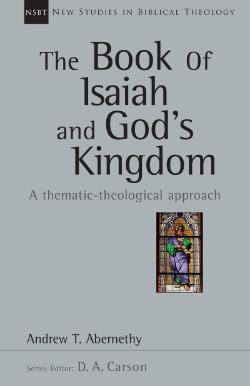Faculty Books
Wheaton College faculty teaching for the M.A. Biblical Exegesis program serve on Bible translation committees and author books and commentaries.

Dr. Andrew Abernethy's conviction is that thematic points of reference can be of great help in encountering Isaiah and its rich theological message. In view of what the structure of the book of Isaiah aims to emphasize, this New Studies in Biblical Theology volume employs the concept of "kingdom" as an entry point for organizing the book's major themes. In many respects, Isaiah provides a people living amidst imperial contexts with a theological interpretation of them in the light of YHWH's past, present and future sovereign reign. Four features of "kingdom" frame Abernethy's study: God, the King; the lead agents of the King; the realm of the kingdom and the people of the King. While his primary aim is to show how "kingdom" is fundamental to Isaiah when understood within its Old Testament context, interspersed canonical reflections assist those who are wrestling with how to read Isaiah as Christian Scripture in and for the church.
Professor Emeritus Dr. Daniel I. Block examines worship in the Bible, offering a comprehensive biblical foundation and illuminating Old Testament worship practices and principles. He develops a theology of worship that is consistent with the teachings of Scripture and is applicable for the church today.
In a book that consists largely of Moses' farewell sermons to his congregation, Israel's first pastor seeks to inspire his congregation to a life of faith and godliness in response to God's great mercy. Unfortunately, for many Christians, Deuteronomy is a dead book, because we have lost sight of the gospel. The essays in this collection by Professor Emeritus Dr. Daniel I. Block arise from a larger project driven by a passion to recover for Christians the life-giving message of the Old Testament in general and the gospel according to Moses in particular.
At its heart, Deuteronomy records the covenantal relationship between God and his people. God graciously has chosen Israel as his covenant partner and has demonstrated his covenantal commitment to them. Moses challenges the Israelites to respond by declaring that Yahweh alone is their God and by demonstrating unwavering loyalty and total love for him through obedience. Professor Emeritus Dr. Daniel I. Block highlights the unity between the God depicted in Deuteronomy and Jesus Christ. Christians who understand the covenantal character of God and who live under the grace of Christ will resist the temptation to retreat into interior and subjective understandings of the life of faith so common in Western Christianity.
Professor Emeritus Dr. Daniel I. Block seeks to recover the life-giving message of the Old Testament by exploring the meaning of specific texts and considering their relevance for Christians today.
A theological exposition on Judges and Ruth.
To most modern readers the book of Ezekiel is a mystery. Few can handle Ezekiel's relentless denunciations, his unconventional antics, his repetitive style, and his bewildering array of topics. This excellent commentary by Dr. Daniel I. Block makes sense of this obscure and often misunderstood prophet and demonstrates the relevance of Ezekiel's message for the church today.
Richard L. Schultz believes the misinterpretation and misapplication of biblical texts amounts to a crisis of "interpretive malpractice." In Out of Context he seeks to explain how biblical interpretation goes wrong and how to get it right. He introduces readers to the important concepts of context, word meaning, genre, and the differences between the world of the Bible and our own. Readers who delve into the fascinating world of biblical interpretation found in this book will find their Scripture reading enhanced and be enlightened by Schultz's powerful and ultimately positive message.
A discussion on the debated authorship of Isaiah and its significance.
Dr. Richard L. Schultz has updated T. Norton Sterrett's classic beginner's guide to understanding the Bible, making it clearer and more helpful than ever before. He suggests some more recent reference tools and offers more examples from contemporary English translations. In a new concluding chapter he helps you try out the principles on Psalm 51. You may begin as a beginner, but you will finish this book well equipped to understand the Bible and to experience its transforming power in your life.
After examining quotation in non-prophetic (ancient Near Eastern, early Jewish, Old Testament wisdom and narrative, and modern Western) literatures, Dr. Richard L. Schultz proposes a new model for interpreting verbal parallels that utilizes several criteria for identifying quotation and combines diachronic with synchronic analysis. He then applies this model to five representative verbal parallels involving the book of Isaiah.
Dr. John H. Walton and Dr. D. Brent Sandy provide a detailed look at the origins of scriptural authority in ancient oral cultures and how they inform our understanding of the Old and New Testaments today. Stemming from questions about scriptural inerrancy, inspiration and oral transmission of ideas, The Lost World of Scripture examines the process by which the Bible has come to be what it is today.
In this astute mix of cultural critique and biblical studies, Dr. John H. Walton presents and defends twenty propositions supporting a literary and theological understanding of Genesis 1 within the context of the ancient Near Eastern world and unpacks its implications for our modern scientific understanding of origins. Ideal for students, professors, pastors and lay readers with an interest in the intelligent design controversy and creation-evolution debates, Walton's thoughtful analysis unpacks seldom appreciated aspects of the biblical text and sets Bible-believing scientists free to investigate the question of origins.
The purpose of studying the Old Testament is to understand God and his redemptive work more fully. However, this goal is complicated by the fact that it was transmitted through a very different language and culture from our own. Dr. John H. Walton and Professor Emeritus Dr. Andrew E. Hill provide an indispensable guide for undergraduate students and other readers by exploring the literary, historical, and theological issues behind the Old Testament and its various books.
An overview background commentary of the entire Old Testament.
Decades of historical and cultural research on the ancient world are provided by Bible scholars Dr. John H. Walton (Old Testament) and Dr. Craig Keener (New Testament) in the NIV Cultural Backgrounds Study Bible. Notes, book introductions, and articles totaling approximately 15 volumes of content ground an additional 375 vivid full-color photos, illustrations, and maps, give relevance to the ancient world in which Scripture was first written.
With extensive research and thoughtful chapter-by-chapter exegesis, Dr. Douglas J. Moo leads readers through all aspects of the book of Galatians--sociological, historical, and theological--to help them better understand its meaning and relevance.
A commentary on Colossians and Philemon.
A commentary on the letter of James.
A commentary on Romans.
Cornerstone Biblical Commentary is designed to equip pastors and Christian leaders with exegetical and theological knowledge to better understand and apply God's Word by presenting the message of each passage as well as an overview of other issues surrounding the text. Dr. Jon C. Laansma authored 2 Timothy, Titus as well as the introductions and notes for 1–2 Timothy and Titus for the NLT Study Bible.
Assessing the study and interpretation of Hebrews across the last two millennia, contributors engage with it from a theological perspective.
The rest motif in the New Testament, especially in Matthew and Hebrews.

